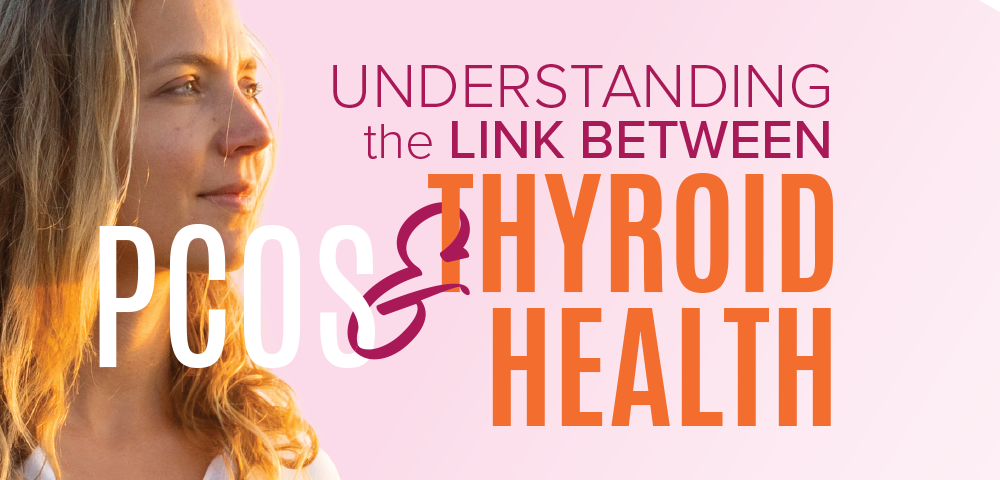
PCOS and thyroid disorders, in particular hypothyroidism (underactive thyroid), are widespread in women of reproductive age
PCOS and thyroid disorders, in particular hypothyroidism (underactive thyroid), are widespread in women of reproductive age. Symptoms include irregular periods, fertility issues, weight gain, fatigue, and mood swings, which can overlap, making it hard to distinguish between two or more conditions. Both are driven by hormonal imbalances that affect reproductive, metabolic, and mental health. Having both conditions can worsen fertility issues and increase risks for heart disease and diabetes.
WHAT IS PCOS?
Polycystic ovary syndrome (PCOS) is a common hormonal disorder that affects about 10–20% of women worldwide. Symptoms include irregular or missed periods (when off birth control), sometimes small cysts on the ovaries (seen on ultrasound), and high androgen (testosterone) levels (e.g., excess facial hair and acne). These may be accompanied by weight gain and scalp hair thinning, as well as mood swings and anxiety – often linked to blood sugar imbalances.
- PCOS is closely linked to insulin resistance, raising the risk of type 2 diabetes and cardiovascular disease.
- What causes PCOS is still unclear, but genetics and lifestyle factors play a role. Excess sugar, highly processed foods, and toxin exposure can disrupt the gut microbiome, leading to inflammation and hormonal dysfunction.
THE PCOS AND THYROID CONNECTION
The thyroid, a small butterfly-shaped gland in your throat, regulates many vital functions, including heartbeat, body temperature, metabolism, mood, and reproductive hormone production. When it’s underactive, a condition called hypothyroidism, it produces too few thyroid hormones, slowing down body functions. This can cause symptoms like fatigue/low energy, brain fog, cold sensitivity, dry skin, hair thinning, weight gain, irregular ovulation, low progesterone, and menstrual issues (e.g., heavy bleeding or irregular cycles), and symptoms of depression.
Hypothyroidism is the most common thyroid disorder in women with PCOS, often each worsening the other condition. Both disrupt hormones and menstrual cycles, impacting fertility.
As well, in aggravating symptoms of PCOS, the combination of both can increase risks of insulin resistance, type 2 diabetes, high cholesterol, weight struggles, and even anxiety and depression. Because symptoms of both conditions overlap, it makes diagnosis more challenging.
Studies have found another connection between PCOS and hypothyroidism. Women with PCOS are more likely to develop Hashimoto’s disease, an autoimmune disorder where the body attacks the thyroid, marked by high thyroid antibodies, as well as thyroid-stimulating hormone (TSH) as the disease progresses. Hashimoto’s, in turn, can often lead to hypothyroidism.
LIMITATIONS OF THYROID HEALTH TESTING
TSH, produced by the pituitary gland (brain), signals the thyroid how much T4 (thyroxine) and T3 (triiodothyronine) to make. While commonly used as a primary marker to assess thyroid health, TSH alone doesn’t always give the full picture and should be tested alongside T4 and sometimes T3.
- The standard TSH reference range is usually 0.4–4.0 mIU/L but is often considered too broad, potentially missing early signs of hypothyroidism.
- Some experts recommend narrowing this range to 0.5–2.5 mIU/L, while others propose “age- and sex-specific” reference ranges (e.g., TSH upper limit may increase with age).
Some people still experience fatigue, weight gain, or brain fog despite having “normal” TSH levels – a condition called functional hypothyroidism. This often requires advanced testing for free T3 and T4, and thyroid antibodies. Routine TSH testing alone may miss several issues, especially in autoimmune thyroid conditions like Hashimoto’s, where TSH can appear normal while T4 and T3 levels are low or ineffective.
SUPPLEMENTS FOR PCOS AND THYROID HEALTH
- Inositol (myo- & D-chiro) and CoQ10 improve insulin sensitivity, hormone balance, and ovarian function.
- Berberine improves metabolic health (insulin resistance and blood lipids) and gut health.
- B vitamins (particularly folate and B12) reduce homocysteine levels (often seen elevated with metformin treatment in PCOS patients) and reduce symptoms of depression, anxiety, and stress.
- Selenium supports T4 to T3 conversion, lowers thyroid antibodies, and supports ovarian health by reducing inflammation.
- Zinc enhances thyroid function, lowers androgens (male hormones), and improves acne.
- Vitamin D promotes fertility (low vitamin D is linked to thyroid dysfunction), menstrual health, and insulin sensitivity.
- Omega-3s reduce inflammation and support heart and hormone health.
- Ashwagandha and magnesium help manage stress, improve sleep, and balance hormones.
- N-acetyl-L-cysteine (NAC) improves ovulation and insulin sensitivity and protects thyroid tissue health.
- Probiotics are essential for gut health, hormone regulation, and thyroid function.
- Iodine is critical for thyroid hormone production, but women with PCOS and hypothyroidism must balance intake carefully – too much or too little can disrupt thyroid function.
If you have PCOS, check your thyroid hormones (including autoantibodies) regularly. Catching issues early and making lifestyle shifts, such as exercise, a nutrient-dense diet, stress management, and quality sleep, are key to managing symptoms and protecting your long-term health. While supplements can provide support, they always work best as part of a holistic approach.













